100+ Academic Citations
Perverse Accountability
Accountability is an amoral tool which can be used for good or evil. It is also easily harnessed by the powerful. As such, the idea that increased transparency leads to increased electoral accountability has been shown to be less robust than many pundits and scholars assume. Worse, it appears that all increases in government accountability often overwhelmingly benefit the powerful and foster corruption. Scholar Susan C. Stokes calls this mechanism ‘perverse accountability.’
By James D’Angelo & Ronald Nsubuga March 17, 2023
Citations
Government accountability to the public isn’t as straightforward as conceived. In our CRI paper, we have develop the math and theories to support this notion accountability is often perverse. We conclude that even dramatic increases in government transparency result in little or no increase in electoral control and often foment greater corruption.
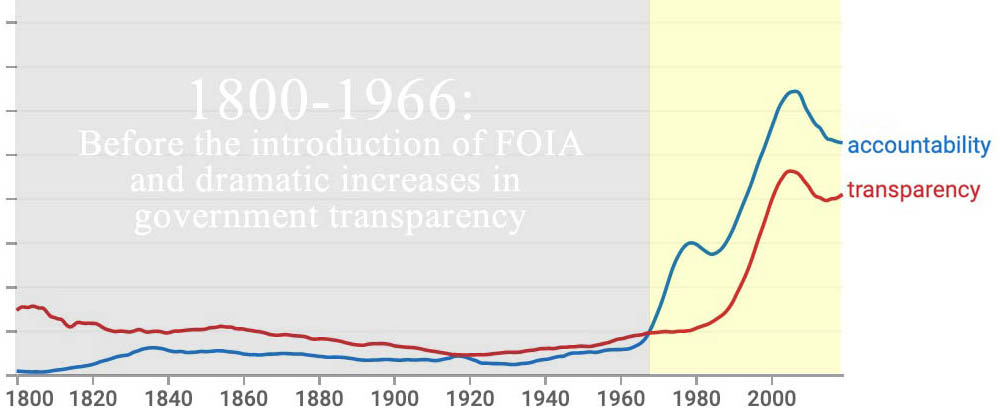
Google Ngram 2020 - ‘accountability’ & ‘transparency’
The Google Ngram Viewer or Google Books Ngram Viewer is an online search engine that charts the frequencies of any set of search strings using a yearly count of n-grams found in sources printed between 1500 and 2019.

Google Ngram 2020 - ‘accountability’ & ‘transparency’
It is also worth noting that the discussion of terms like ‘accountability’ and ‘transparency’ are new discussions. So while Americans did hold to the idea of “no taxation withot representation,” before 1990 it is exceedingly rare to encounter either term (‘accountability’ or ‘transparency’) used with respect to government. This isn’t because no one considered these things. Instead, since the time of Aristotle direct (and accountable) democracies have a poor history. So democratic increases in either transparency or accountability are often fraught with problems and tend to lead to greater control by demagogues, chaos or the powerful.
Below we collect citations on this topic.
By far the most common assumption is that transparent, accessible information will generate accountable policies and budgets and responsive, accountable state behaviour – an assumption that in fact glosses over a number of leaps.Rosemary McGee & John Gaventa 2011
Assessing Impact of Accountability
Greater “electoral accountability” mostly seems to have involved catering to the interests of an affluent (and probably more attentive) minority of the electorate.Christopher Achen & Larry Bartels 2016
Democracy for Realists
[There is a] deficit in accountability that arises because voters are so poorly informed about politics and legislation,Jane S. Schacter 2006
Political Accountability
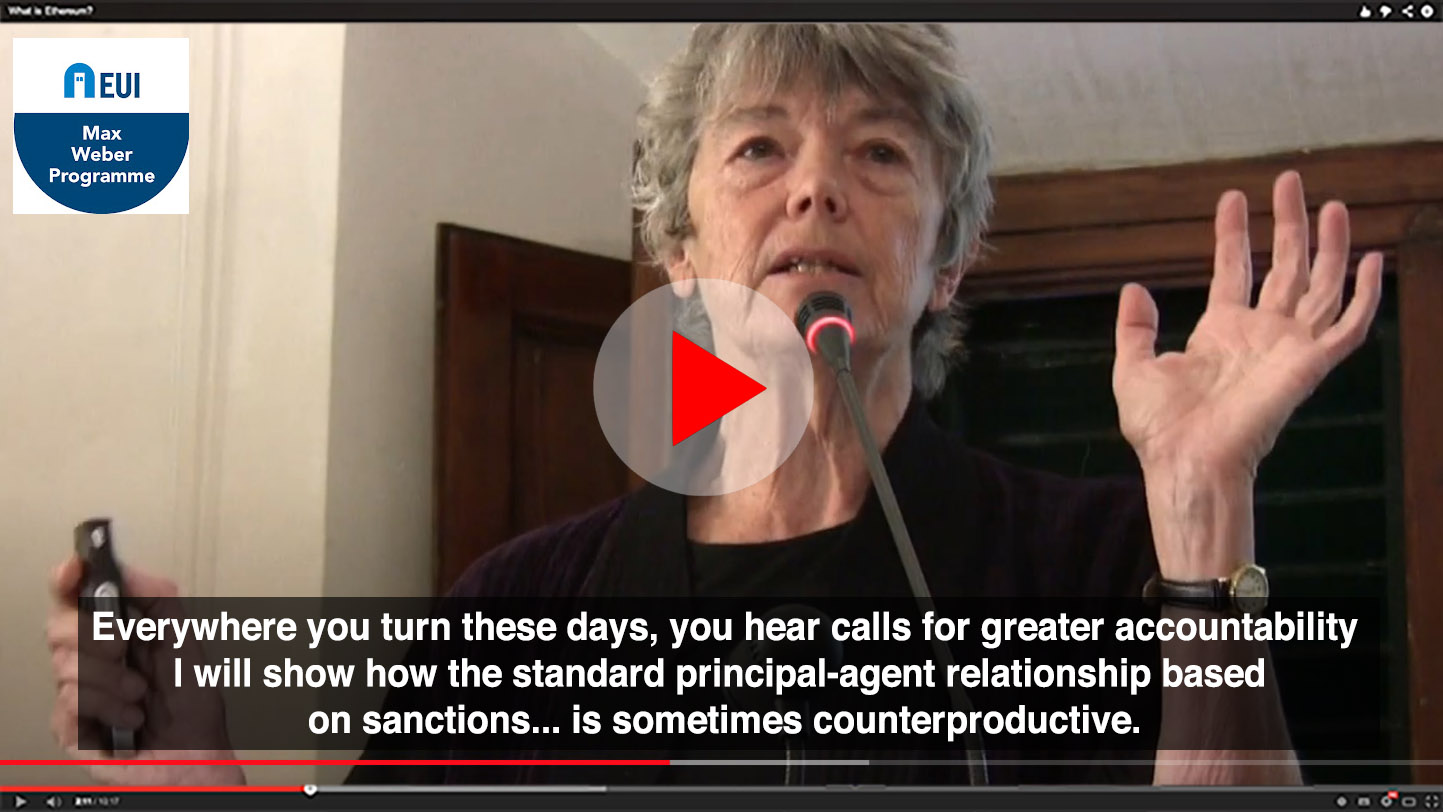
Jane Mansbridge 2010 - Against Accountability<
I will show how the standard principal-agent relationship based on sanctions fits the standard understanding of accountability and how it is sometimes counterproductive. I will show how the alternative relationship based on selection fits an alternative understanding of accountability, and how, when this alternative relationship is possible, it can be both more efficient and more morally satisfying...Another implication is that sometimes the many calls you hear for more transparency in the workings of government may also be wrong.

Jane Mansbridge 2010 - Against Accountability<
There is no clear support for the common belief that transparency always increases accountability.David Stadelmann, Marco Portmann and Reiner Eichenberger 2014
Transparency Does Not Increase the Quality of Political Representation
Transparency requirements can make accountability confusing and difficult to achieve.Nieves Zúñiga 2018
Does more Transparency improve Accountability?
The congressional sunshine initiative became a tool for the very special interests whose power the reforms were supposed to dilute. Corporations and lobbying groups have seized on the open hearings to help them hold legislators accountable as never before.Martha Hamilton 1984 – The Washington Post
Opening Up Congress
There was no statistically significant evidence that transparency created the predicted outcomes of increased accountability.Brigham Daniels, Mark Buntaine & Tanner Bangerter 2020
Testing Transparency
Casting an individual vote has roughly the same power over political outcomes as praying to Jupiter or blowing one’s nose.Jason Brennan 2016
Against Democracy
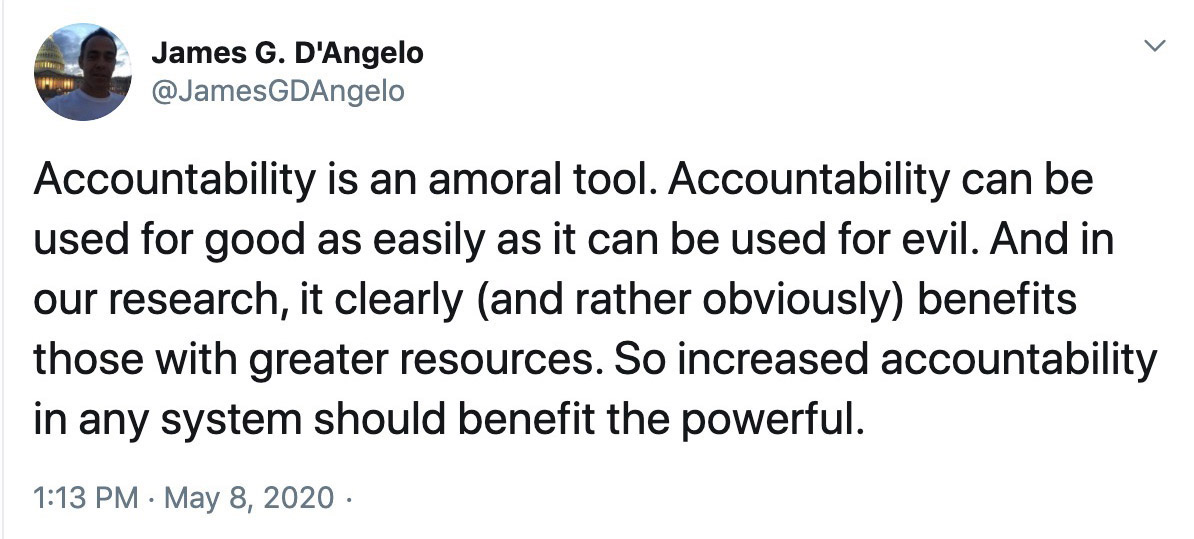
James D’Angelo 2020 – Accountability is an amoral tool
Accountability is an amoral tool. Accountability can be used for good as easily as it can be used for evil. And in our research, it clearly (and rather obviously) benefits those with greater resources. So increased accountability in any system should benefit the powerful.

James D’Angelo 2020 – Accountability is an amoral tool
The logic of accountability applies just as well to lobbyists as to constituents. Government representatives who are being closely watched by special interests will find themselves under pressure to please those interests.Brent Ranalli 2018
The Sunshine Reforms and Transformation of Lobbying
Holding officials directly accountable to voters can result in lower levels of performance in complex policy areas.Alexander Whalley 2013
Elected versus Appointed Policy Makers
Democratic accountability usually means that voters know, or can make good inferences about, what parties have done in office and reward or punish them conditional on these actions. But when parties know, or can make good inferences about, what individual voters have done in the voting booth and reward or punish them conditional on these actions, this is perverse accountability. We usually think of accountability in democratic systems as a good thing: it means that voters can keep elected officials from misbehaving and pressure governments to be more responsive to voters. But perverse accountability is bad for democracy: it reduces the pressure on governments to perform well and to provide public goods.Susan C. Stokes 2005
Perverse Accountability
The same structures and mechanisms that promote the accountability of officials to one group may have the unintended effect of promoting the accountability of the same officials to a different group. Under some range of circumstances, the former type of accountability might be democratically desirable, whereas the latter type would be democratically harmful. If so, there is a kind of tradeoff within accountability itself.Adrian Vermeule (Harvard Law) 2007
Mechanisms of Democracy
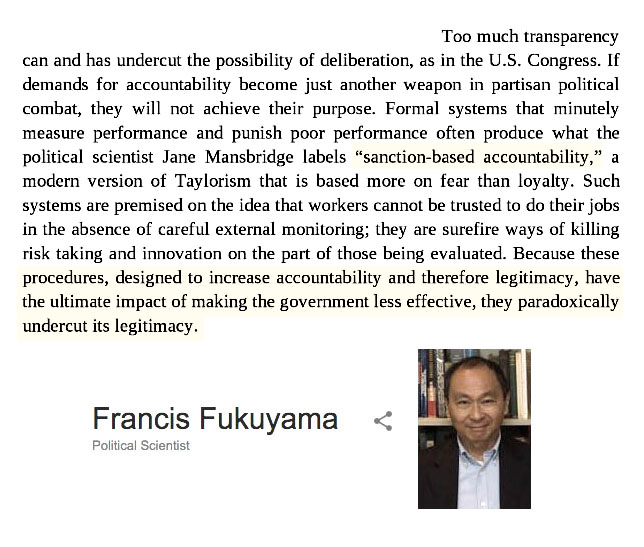
Francis Fukuyama 2014 – Political Order and Political Decay
Because these procedures, designed to increase accountability and therefore legitimacy, have the ultimate impact of making the government less effective, they paradoxically undercut its legitimacy.

Francis Fukuyama 2014 – Political Order and Political Decay
It may, unquestionably, be the fact that if we attempt, by publicity, to make the voter responsible to the public for his vote, he will practically be made responsible for it to some powerful individual, whose interest is more opposed to the general interest of the community than that of the voter himself would be if, by the shield of secrecy, he were released from responsibility altogether. When this is the condition, in a high degree, of a large proportion of the voters, the ballot may be the smaller evil. When the voters are slaves, anything may be tolerated which enables them to throw off the yoke. The strongest case for the ballot is when the mischievous power of the Few over the Many is increasingJohn Stuart Mill 1861
Stanford Encyclopedia of Philosophy
How can citizens control legislators when most citizens pay scant attention to public affairs? Why should legislators worry about citizens’ preferences when they know most citizens are not really watching them?Douglas Arnold 1993
Can Inattentive Citizens Control Representatives?
The people as a whole tend to be quite indifferent to policies and therefore are not eager to hold government accountable for the policies it produces.John Hibbing & Elizabeth Theiss-Morse 2004
Stealth Democracy
Opening Congress up was always aimed at making Congress more understandable and accountable to the broader American public, not at empowering interest groups. But transparency’s effect is often precisely contrary to its intended purpose.Frances Lee (Princeton) 2019
Select Committee on the Modernization of Congress
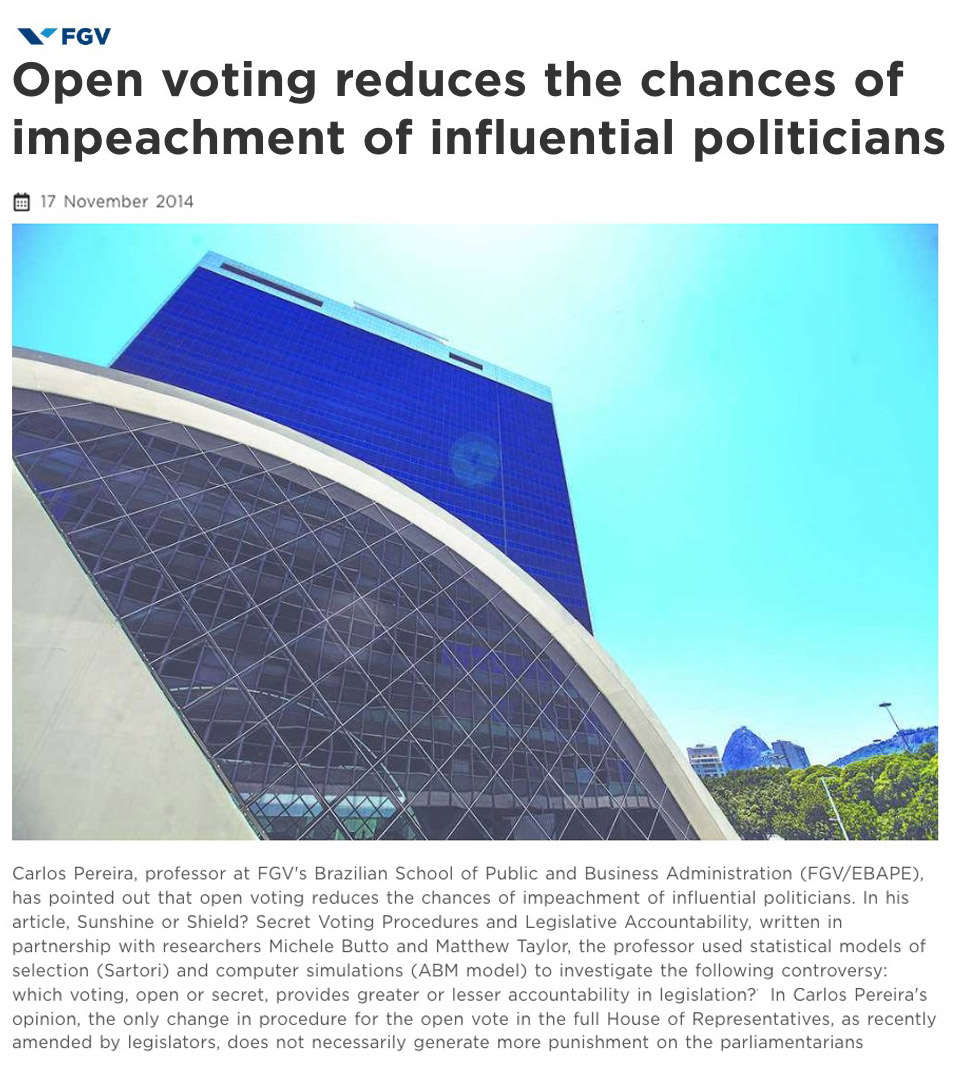
Carlos Pereira 2014 - Open voting reduces the chances of impeachment

Carlos Pereira 2014 - Open voting reduces the chances of impeachment
We calculate that representatives legislate in a world almost entirely devoid of electoral accountability – regardless of the level of transparency. And even dramatic increases in government transparency result in little or no increase in electoral control.James D’Angelo, David King, Brent Ranalli 2018
Separating The Siamese Twins of ‘Good’ Governance
The idea that greater transparency and accountability is a necessary path to better bureaucracy flies in the face of a great deal of history, in which relatively clean, modern bureaucracies have been built under nondemocratic circumstances.Francis Fukuyama 2014
Political Order and Political Decay
Our individual votes make no difference. When it comes to politics, smart doesn’t pay, and dumb doesn’t hurt. An individual vote for the worst possible candidate produces the same results as a vote for the best possible candidate. Abstaining from voting produces the same results as voting. A well-informed vote produces the same results as a badly informed, misinformed or irrational vote. An individual vote after careful deliberation produces the same results as voting after flipping a coin or dropping acid.Jason Brennan 2016
Against Democracy
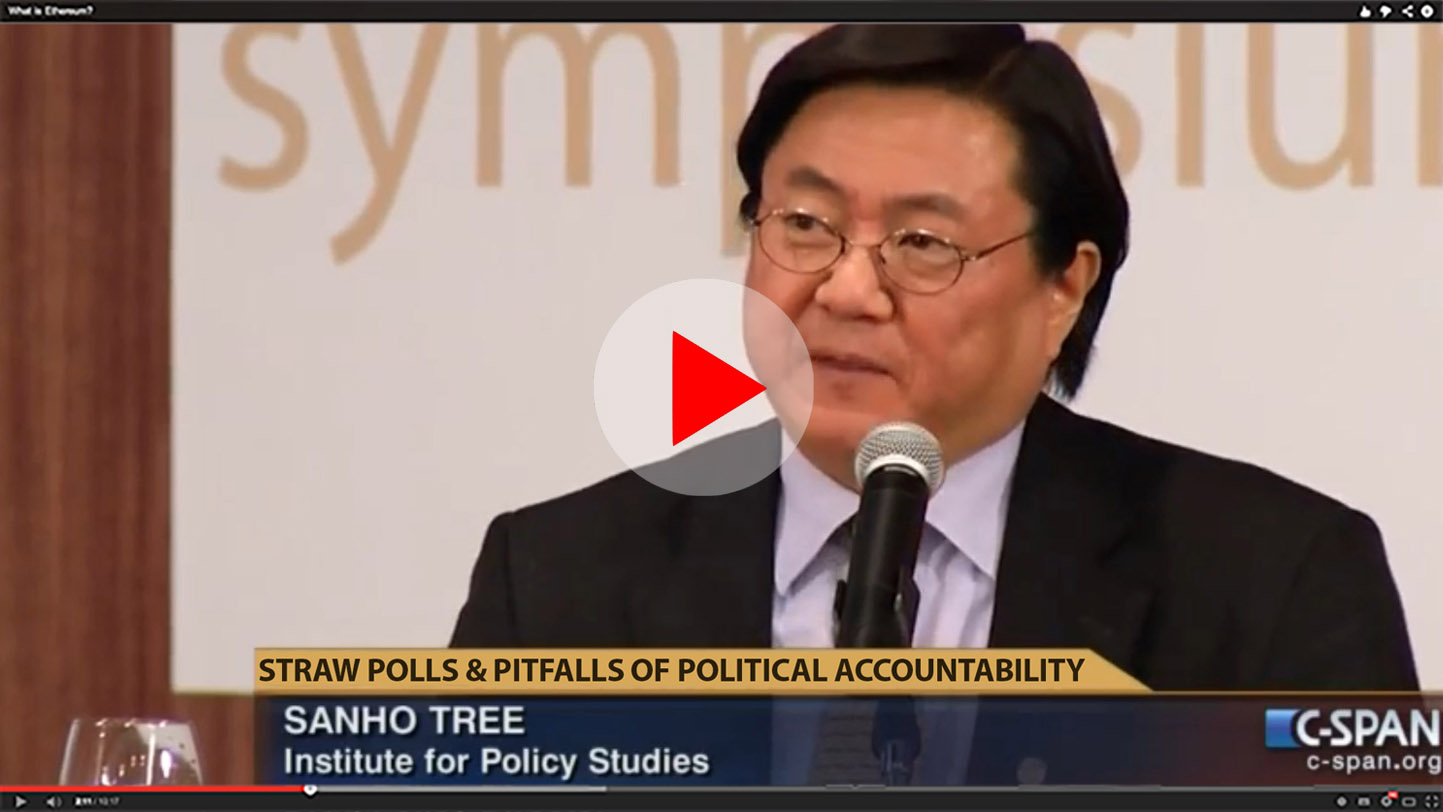
Sanho Tree 2015 - Straw Polls, Secret Voting, and the Pitfalls of Accountability
EXCERPT: I think one of the ways to do that, again, it’s very counterintuitive, is that there’s too much accountability for politicians. Before you freak out and think I’m crazy, let me give you an example of what I mean by that. Oscar Wilde once said, “If you want someone to tell you the truth, give them a mask.”... So if you were able to do a (secret straw poll) survey in Congress today and it turned out that, say, two-thirds wanted to tax and regulate cannabis, if you release the aggregate number, the result of that, no names attached, just that in aggregate two-thirds of Congress actually believes this, then that gives some political cover for politicians to stand up and do the right thing, the courageous thing. They can say, “Look, I’m actually being courageous by saying publicly what my colleagues all believe privately – that it’s time we change our policies on this issue.” And I think that’s a way to solve a lot of third rail issues in Washington. We’re running out of time, both me and Congress, to deal with very serious issues, things like climate change, sensible gun control, or other issues that are controversial politicians cannot deal with. They’re paralyzed because they’re pinned down by these gotcha votes.

Sanho Tree 2015 - Straw Polls, Secret Voting, and the Pitfalls of Accountability
We now have cameras operating in the House and Senate, which on rare occasions capture actual debate, but are more commonly used as a stage backdrop for politicians recording something for use in their next fund-raiser or political ad. When public votes are taken much more often, then more votes are also taken just for show in an attempt to rally one’s supporters or to embarrass the other party, rather than for any substantive legislative purpose. Politicians who are always on-stage are likely to display less civility and collegiality and greater polarization, lest they be perceived as insufficiently devoted to their own causes – or even showing the dreaded signs of a willingness to compromise.Timothy Taylor 2019
When Special Interests Play in the Sunlight
The problem is, of course, is that if Americans aren’t paying attention, they can’t hold anybody accountable...If we use statistics on what the people don’t know...the statistics are just appalling.Rick Shenkman 2008
CNN (How Stupid Are Americans)
The seeming truism – that increasing voters’ direct control of decisions and politicians enhances democratic accountability – has, in fact, the opposite effect. The remedies turn out to be the political equivalent of bloodletting. Either they have no impact on the malady they are meant to address or –more often – they make it worse.Frances Rosenbluth & Ian Shapiro 2018
Responsible Parties
Then there is the question of to whom our elected officials are accountable. One would presume the obvious answer is the electorate; at least, that would be the ideal. However, there are times elected officials must transcend accountability to those they directly represent for the greater ideal of benefiting the country as a whole. There is also the clearly problematic temptation for our representatives to serve the interests of donors or others with influence. Accountability to the wrong people for the wrong reasons is at the root of government corruption.Glenn Davis 2014
Transparency vs. Accountability
Nonaccountability [e.g., restricting the power of voters to punish government officials] is most desirable when (a) the electorate is poorly informed about the optimal action, (b) acquiring decision-relevant information is costly, and (c) feedback about the quality of decisions is slow. Therefore, technical decisions, in particular, may be best allocated to judges or appointed bureaucrats.Nobel Laureates: Erik Maskin & Jean Tirole 2004
The Politician and the Judge: Accountability in Government
We build a simple model to capture the major virtues and drawbacks of making public officials accountable (i.e., subjecting them to reelection): On the one hand, accountability allows the public to screen and discipline their officials; on the other, it may induce those officials to pander to public opinion and put too little weight on minority welfare.Nobel Laureates: Erik Maskin & Jean Tirole 2004
The Politician and the Judge: Accountability in Government
Accountability also carries with it two serious possible drawbacks. In order to get reelected, an official may choose an action, not because it is right for society, but because it is popular. That is, she may pander to public opinion.Nobel Laureates: Erik Maskin & Jean Tirole 2004
The Politician and the Judge: Accountability in Government
Because of familiar collective action problems, well-organized groups, who monitor legislative activity closely, are much better situated than the mass electorate to secure real accountability from incumbent legislators. And these groups have more resources for demanding accountability; they have not just individual votes with which to threaten lawmakers, but the ability to aggregate many votes and to withhold or deploy resources like lobbyist assistance, contributions, and the threat of independent spending. Unorganized groups do not enjoy these advantages and often lack the ability even to push their issues on to the agenda. All of this suggests that the rhetoric of widespread accountability n1ay obscure the reality of too much accountability for some and not enough for many.Jane Schacter 2006
Political Accountability
Voters cannot hold legislators responsible without sufficient information about what legislators have, in fact, done. Yet that sort of information consistently eludes the electorate. It is an article of faith among political scientists that citizens are woefully uninformed about politics.Jane Schacter 2006
Political Accountability
This review underscores the falsity of the conventional wisdom – often born out of frustration at irrational, insensitive, or lazy decision makers – that accountability is a cognitive or social panacea: “All we need to do is hold the rascals accountable.” Two decades of research now reveal that (a) only highly specialized subtypes of accountability lead to increased cognitive effort; (b) more cognitive effort is not inherently beneficial; it sometimes makes matters even worse; and (c) there is ambiguity and room for reasonable disagreement over what should be considered worse or better judgment when we place cognition in its social or institutional context. In short, accountability is a logically complex construct that interacts with characteristics of decision makers and properties of the task environment to produce an array of effects – only some of which are beneficial. Jennifer Lerner & Philip Tetlock 1999
Accounting for the Effects of Accountability
Accountability is likely to amplify biases...People can simply adopt positions likely to gain the favor of those to whom they are accountable, thereby allowing them to avoid the unnecessary cognitive work of analyzing the pros and cons of alternative courses of action, interpreting complex patterns of information, and making difficult trade-offs. In support of these predictions, experimental work has repeatedly shown that expecting to discuss one’s views with an audience whose views are known led participants to strategically shift their attitudes toward that of the audience...Defensive bolstering should also lead people to generate as many reasons as they can why they are right and potential critics are wrong. This generation of thoughts consistent with one’s views then leads people to hold even more extreme opinions.Jennifer Lerner & Philip Tetlock 1999
Accounting for the Effects of Accountability
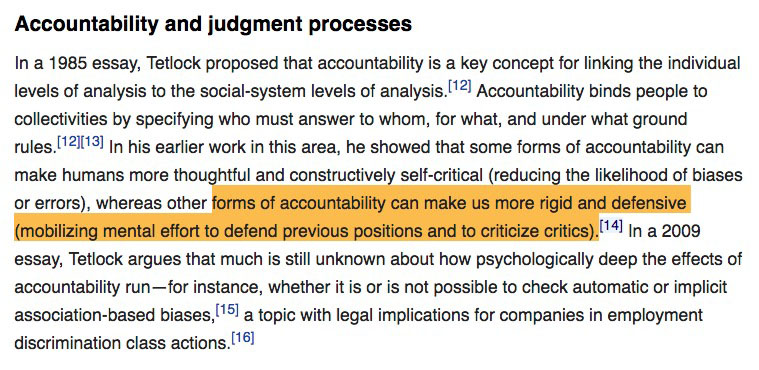
Philip Tetlock 1999 – Accountability Processes

Philip Tetlock 1999 – Accountability Processes
The American system does not make it easy for citizens to hold elected officials accountable for governmental decisions.Douglas Arnold 2004
Congress, Press and Accountability
Our contrast between good and bad accountability, to voters and to interest groups, is deliberately overdrawn to clarify the issues... The groups that benefit most from fishbowl transparency and immediate access to details of ongoing negotiations are tightly organized groups seeking transfers to particular economic interests.Elizabeth Garrett & Adrian Vermeule 2006
Transparency in the Budget Process
Vertical accountability via elections has proven largely ineffective as a mechanism for ending the careers of corrupt incumbents, though the failure of this mechanism remains poorly understood.Marcia Grimes 2015
The Intricacies of Accountability
Although the societal accountability mechanism linking transparency and good government is often implied, it builds on a number of assumptions seldom examined empirically. This article unpacks the assumptions of principal agent theories of accountability and suggests that the logic of collective action can be used to understand why exposure of egregious and endemic corruption may instead demobilize the demos (i.e., resignation) rather than enhance accountability (i.e., indignation). We explore these theoretical contentions and examine how transparency affects three indicators of indignations versus resignation—institutional trust, political involvement, and political interest—given different levels of corruption. The empirical analyses confirm that an increase in transparency in highly corrupt countries tends to breed resignation rather than indignation Monika Bauhr & Marcia Grimes 2015
The Implications of Transparency for Societal Accountability
When you create a regulatory agency, you put together a group of people whose job is to solve some problem. They’re given the power to investigate who’s breaking the law and the authority to punish them. Transparency, on the other hand, simply shifts the work from the government to the average citizen, who has neither the time nor the ability to investigate these questions in any detail, let alone do anything about it. It’s a farce: a way for Congress to look like it has done something on some pressing issue without actually endangering its corporate sponsors.Aaron Swartz 2006
When is Transparency Useful?
Jonath Haidt Ted Talk 2012
Wealthy interests hold our members accountable. “It’s like a money gun aimed at your head. If you step out of line, there is a ton of money waiting to be given to your political opponent.” Full talk
Jonath Haidt Ted Talk 2012
Wealthy interests hold our members accountable. “It’s like a money gun aimed at your head. If you step out of line, there is a ton of money waiting to be given to your political opponent.” Full talk
Forcing the publication of votes in an institutional setting that relies on diplomatic practices can have deleterious effects on accountability: In some cases, the publication of votes might operate as a window-dressing device, prompting the public belief that [legislators] are accountable since they publish their votes, while real monitoring of the decision makers’ stances is not possible.Stephanie Novak 2015
Secrecy and Publicity
The opening up of the legislative process can make lawmakers much more directly accountable to interest groups whose support they may need for reelection. Lobbyists, after all, now actually sit in on committee markup sessions. This may constrain the policymaking efforts of lawmakers to actions that serve the interests of narrow groups at the expense of the broader public good.Joseph Bessette 1994
Mild Voice of Reason
In the real world of American politics, interested individuals and organizations, not average citizens, have the greater incentive and means to monitor the government closely. This can open the door to obstruction and policy distortion as it enables regulatory capture by interested parties who advocate freely for their views without any countervailing public voice.Bruce Cain 2014
The Transparency Paradox
What in fact is an election? We call it an expression of the popular will. But is it? We go into a polling booth and mark a cross on a piece of paper for one of two, or perhaps three or four names. Have we expressed our thoughts on the public policy of the United States? Presumably we have a number of thoughts on this, and that with many buts and ifs and ors. Surely the cross on a piece of paper does not express them. It would take us hours to express our thoughts, and calling a vote the expression of our mind is an empty fiction.Walter Lippman 1925
The Phantom Public
Nor in any exact and literal seense are those who conduct the daily business of government accountable after the fact to the great mass of the voters. They are accountable only, except in spectacular cases, to the other politicians, officeholders and influential men directly interested in the particular act. Modern society is not visible to anybody, nor intelligible continuously and as a whole. One section is visible to another section, one series of acts is intelligible to this group and another to that.Walter Lippman 1925
The Phantom Public
Members of Congress, as individuals, have little incentive to respond to general interests, but have compelling reasons to service organized groups. The electorate rarely knows how members vote and does not hold individual legislators responsible for national conditions. Organized interest groups do monitor the members' activity, and they reward dedicated service with campaign contributions and other support.Paul Quirk 1991
Evaluating Congressional Reform
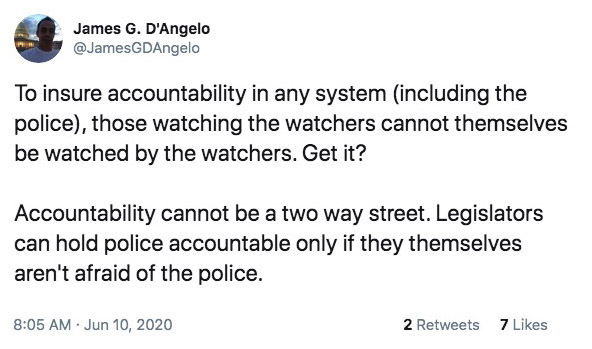
James D’Angelo 2020 – Accountability requires eliminating fear

James D’Angelo 2020 – Accountability requires eliminating fear
(Members grow to) feel more accountable to some constituents than to others because the support of some constituents is more important to them than the support of others.Richard Fenno 1976
House Members in their Constituencies
Elections, however, occur only periodically, and their effectiveness atsecuring vertical accountability is unclear.Guillermo O'Donnell 1998
Horizontal Accountability in New Democracies
If nobody else cares about it very much, the special interest will get its way. If the public understands the issue at any level, then special interest groups are not able to buy an outcome that the public may not want. But the fact is that the public doesn’t focus on most of the work of the Congress. Most of the work of the Congress is very small things... And all of us, me included, are guilty of this: If the company or interest group is (a) supportive of you, (b) vitally concerned about an issue that, (c) nobody else in your district knows about or ever will know about, then the political calculus is quite simple. Rep. Vin Weber (R-Min) 1995
Speaking Freely (Schram)
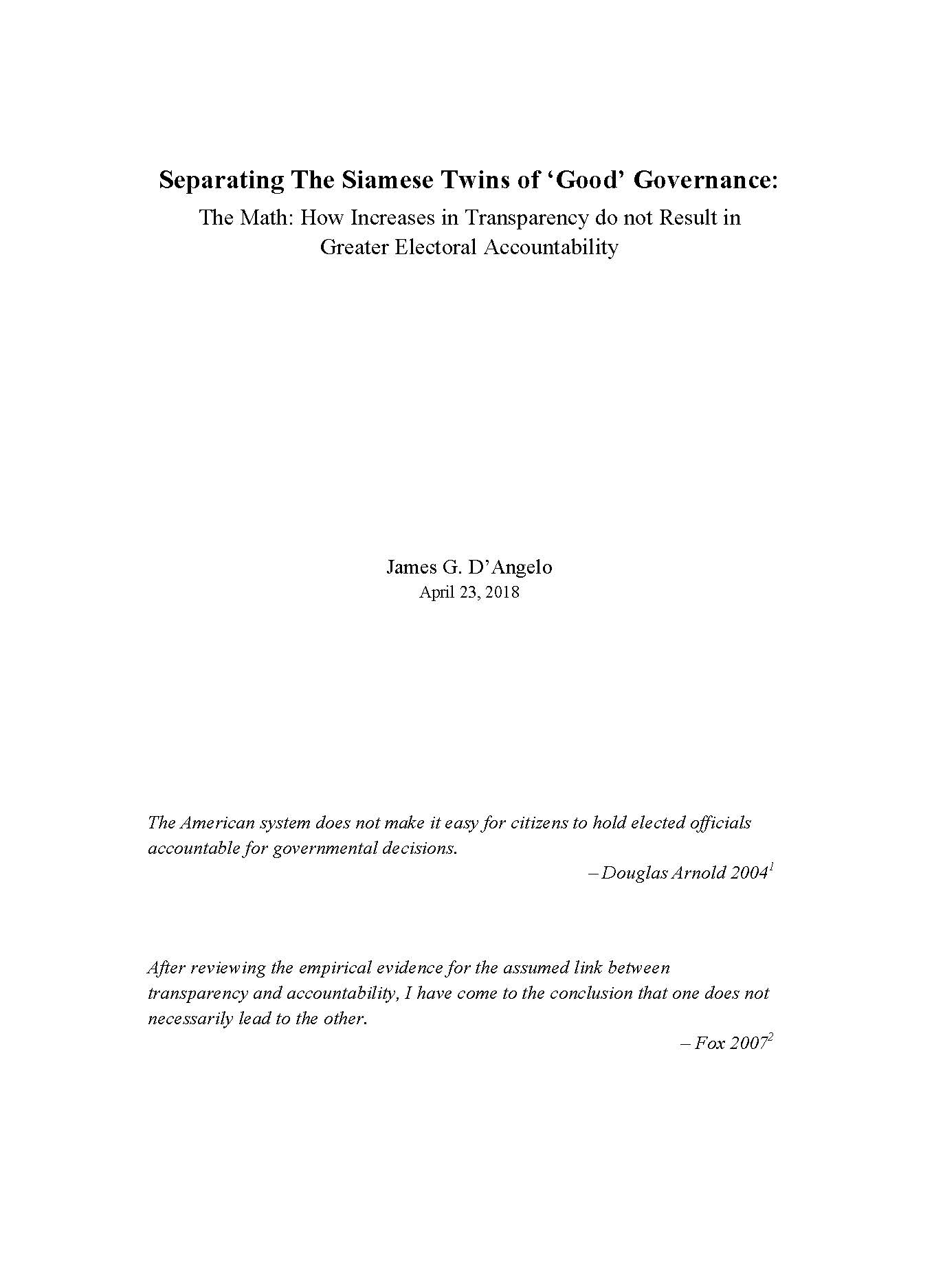
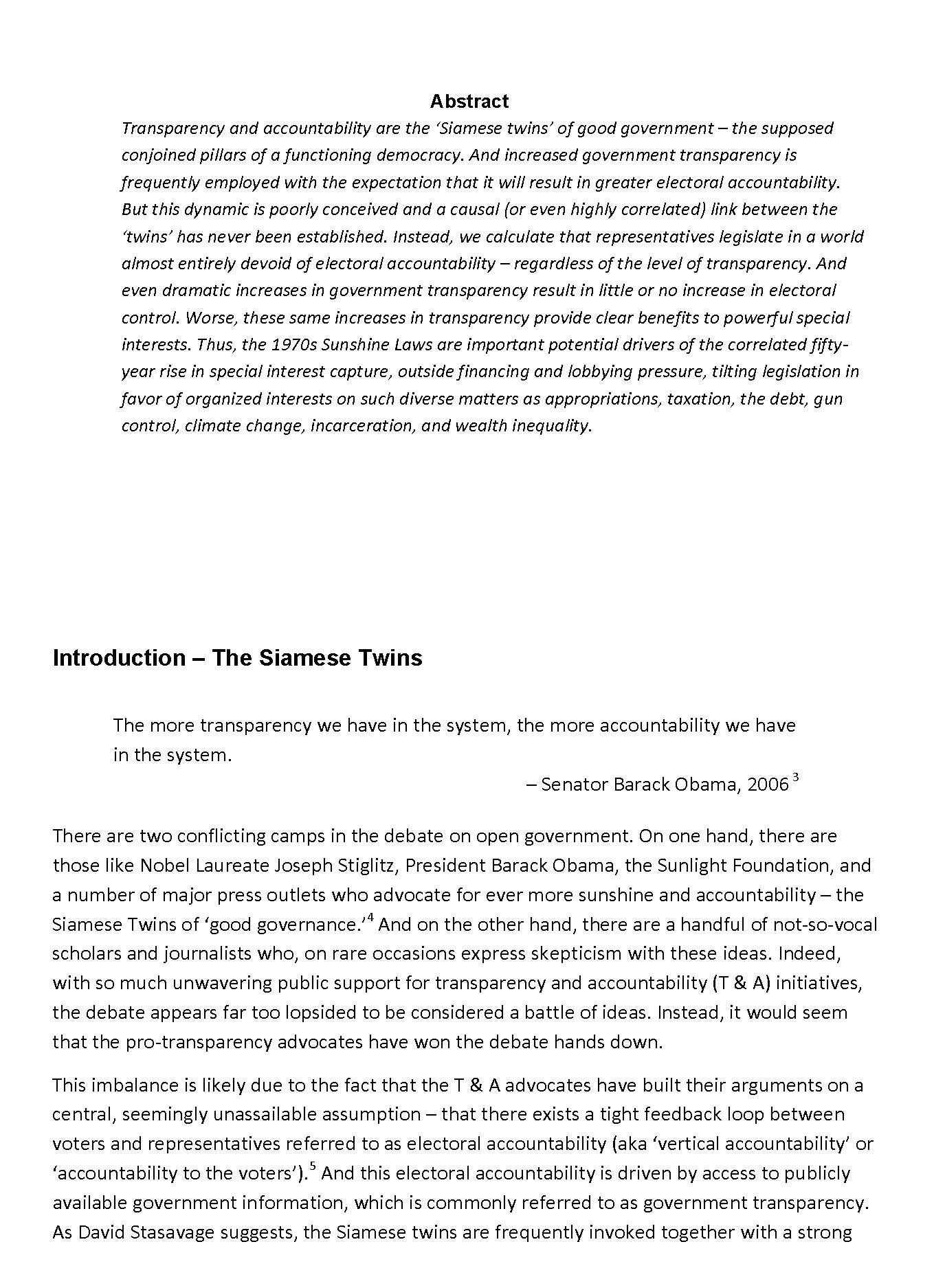
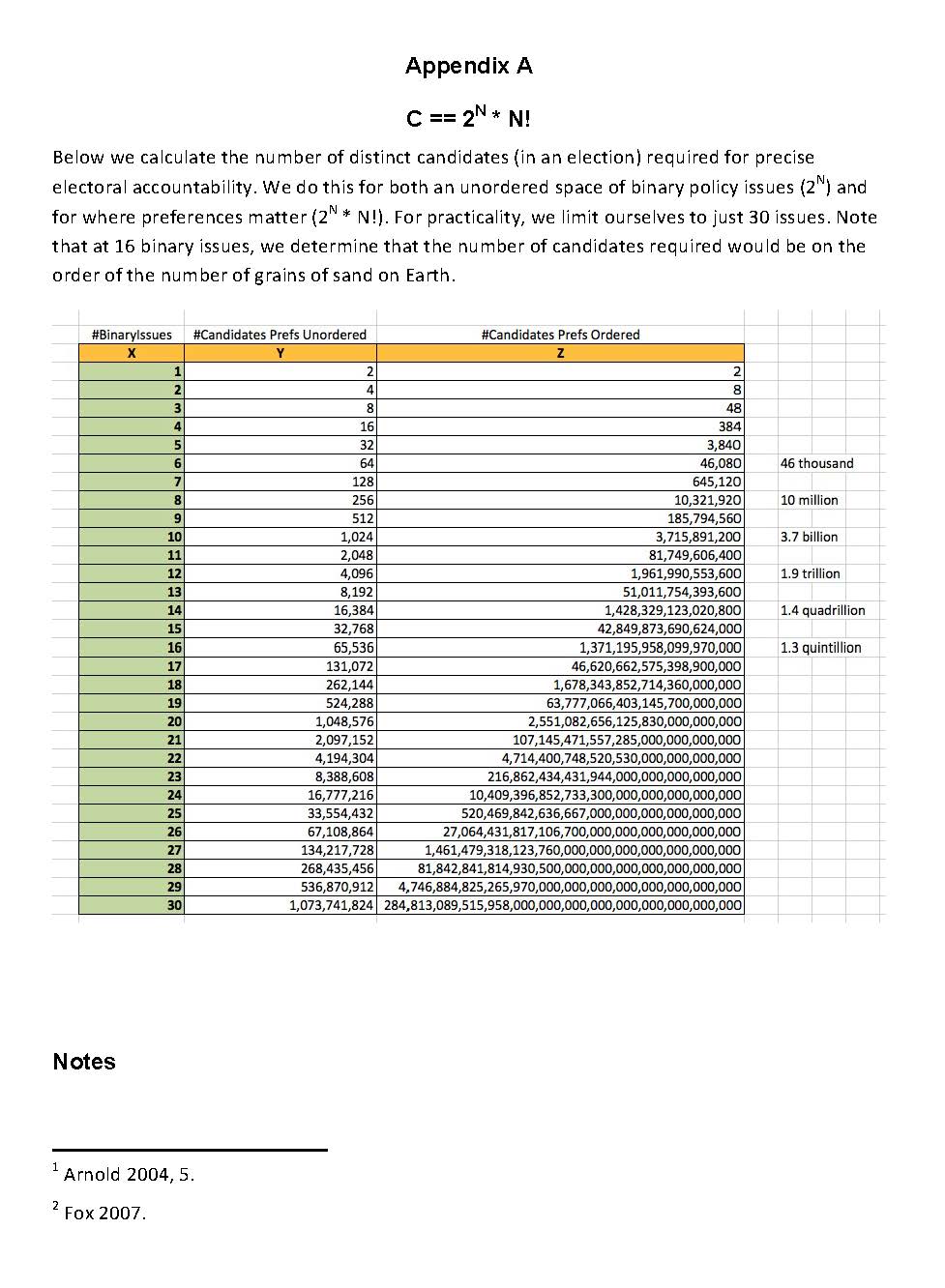
James D’Angelo 2018 - Siamese Twins

James D’Angelo 2018 - Siamese Twins
Opening meetings to the public has meant opening meetings to everyone, including lobbyists, who, it has been claimed, take an even greater part in writing Ways and Means legislation than they did in the past...Thus, the open meetings have made members more accountable to whoever cares to pay attention. Catherine Rudder 1977
Committee Reform
The assumed link leads from awareness (through transparency and information) to articulating voice (through formal and informal institutions) and ultimately accountability (changing the incentives of providers so that they respond in fear of sanctions). Yet, this chain of causation is seldom explicitly examined. In fact, many initiatives are focussed at increasing transparency and amplifying voice, without examining the link of these with accountability.Anuradha Joshi 2011
Impact & Effectiveness of Accountability
One of the folk arguments for electing government officials is “accountability.” Citizens, the story goes, need to be able to hold elected officials accountable, and one way to hold them accountable is to retain the right to fire and replace them. But in the case of city treasurers, it’s easy to measure (much of) the job the treasurer is doing: just look at the interest rate on the city debt. But even when such a key quality index is so easy to measure, voting citizens do an awful job of keeping the city treasurer accountable. The better option is to let other city officials – the elected mayor, the city council, or maybe the appointed city manager – pick a treasurer and then keep an eye on the job she’s doing. Those city officials will surely notice if the treasurer is saving the city over $200,000 a year, even if voters are too preoccupied watching cat videos to do the job.Garrett Jones 2020
10% Less Democracy
The final set of claims is that transparency and accountability initiatives lead to greater empowerment of poor people...In the case of accountability initiatives however the logic is less straightforward: does the active practice of holding public providers to account lead to citizens getting empowered and more likely to engage with other processes related to citizenship? The causal relationship might be the other way around, it is citizens who are mobilised and already participating in other ways (advocacy, self provisioning [i.e. special interest groups]) who are more likely to engage in accountability activities.Anuradha Joshi 2011
Impact & Effectiveness of Accountability
Too much transparency can and has undercut the possibility of deliberation, as in the U.S. Congress. If demands for accountability become just another weapon in partisan political combat, they will not achieve their purpose. Formal systems that minutely measure performance and punish poor performance often produce what the political scientist Jane Mansbridge labels “sanction-based accountability,” a modern version of Taylorism that is based more on fear than loyalty. Such systems are premised on the idea that workers cannot be trusted to do their jobs in the absence of careful external monitoring; they are surefire ways of killing risk taking and innovation on the part of those being evaluated. Because these procedures, designed to increase accountability and therefore legitimacy, have the ultimate impact of making the government less effective, they paradoxically undercut its legitimacy.Francis Fukuyama 2014
Political Order and Political Decay
The simulation also casts doubt on sunshine approaches to accountability that assume transparency is always the best remedy. While we are cautious in drawing conclusions from the simulation, it does show that under certain simulated conditions, open voting may be less effective than secret voting in driving accountability. If nothing else, this suggests that further research about the effects of open voting is warranted, and that it might be worth contemplating different rules depending on who is being tried, such as secret voting during the legislative trials of congressional leaders, and open voting for backbenchers.Michele Buttò, Carlos Pereira & Matthew Taylor 2014
Sunshine or Shield? Secret Voting Procedures and Legislative Accountability
The article argues that existing transparency policies do not actually strengthen public accountability.Jennifer Shkabatur 2012
Transparency With(out) Accountability
Overall, our review [of transparency and accountability studies] found that much of the current evidence relies on untested normative, positivist assumptions and under-specified relationships between mechanisms and outcomes. Much of the empirical work reviewed is based on poorly articulated, normatively-inspired ‘mixes’, that draw unevenly from the concepts of transparency, accountability, good governance and empowerment. Virtually none of the literature gathered explores possible risks or documents negative effects or arising from TAIs, although some begins to note these at an anecdotal or speculative level.John Gaventa & Rosemary McGee 2011
Impact of Transparency & Accountability (evidence)
Despite its normative importance in contemporary politics, democratic accountability has not been well developed conceptually... In academic scholarship, references to democratic accountability recur throughout the canon of democratic theory, yet the concept has rarely been the subject matter of sustained theorizing.Craig T. Borowiak 2011
Impact of Transparency & Accountability (evidence)
Government accountability, a true cornerstone of representative government, cannot function properly if the parties competing for power are not being judged on a correct basis by voters who under such circumstances are unable to hold their leaders accountable. If voters do not know who the government is, the logic of representative government is disrupted.Lauri Rapeli 2016 - Who to punish? Retrospective voting
Asymmetry gives terrorists and cybercriminals their strength, since such adversaries operate beyond accepted international norms and value systems...The enormous size of our [USA] democratic institutions makes military planning and weapons procurement both cumbersome and publicly accountable. Our future adversaries will be under no such restrictions. Their operations will be fast and simple, leaving no paper trails and incurring no public oversight: that will be their advantage.Robert Kaplan 2002 - Warrior Politics
Most important — and completely ignored by the champions of transparency — is the fact that even the most conscientious citizens, dedicated to following public affairs, have but one vote to weigh in on myriad issues. Most of the time, citizens cannot vote up or down any specific program. Exceptions include some local or state initiatives, such as bonds for schools or referenda on social issues like gay marriage. However, most of the time, especially at the national level, voters cannot be in favor of, say, much more funding for climate change, only a little more funding for ocean exploration, and less funding for bombers (or any such other combination). Rather, all they can do is vote up or down their representative, who, in turn, votes on many scores of programs.Amitai Etzioni 2014 – Atlantic
Transparency is Overrated
These first two accountabilities are in tension: too much responsiveness to particular citizens (i.e. too narrowly-drawn “preference accountability”) can lead to classic corruption.Lee Drutman 2013
OpenGov Conversations
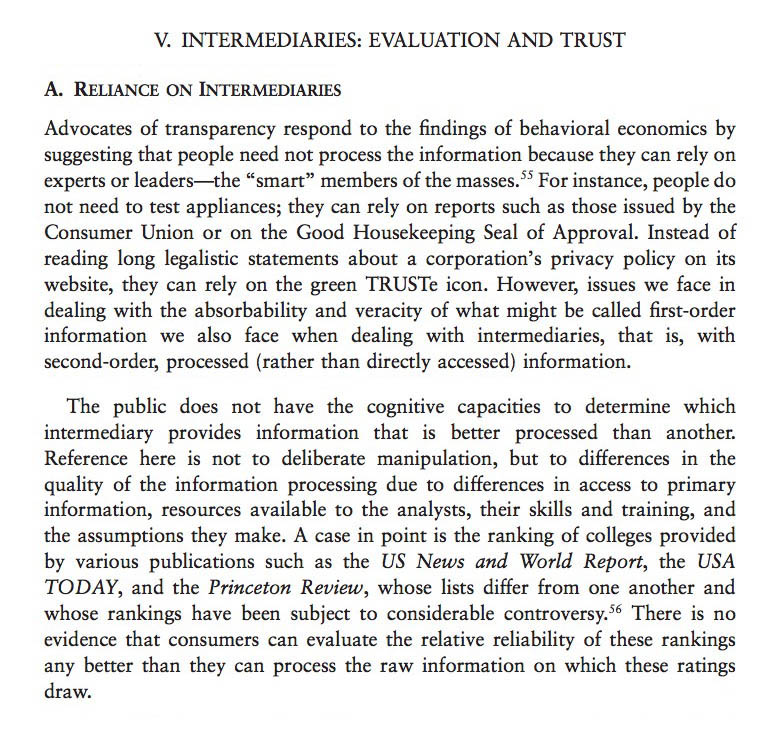
Etzioni 2014 – Is Transparency the Best Disinfectant?
*NOTE: What Etzioni is underlying here, rather beautifully, is that when the public do not monitor and follow legislation, they cannot then turn to civic groups to do so either as the citizens will run into the same trust/accountability problems with the civic groups that they originally had with their legislators.

Etzioni 2014 – Is Transparency the Best Disinfectant?
Notice as well that the very idea of accountability assumes that voters view elections as an occasion for retrospective assessment of the incumbent’s performance that is, for holding legislators to account. There is surely classic work that supports this idea, and it may, at a minimum, capture part of the electoral dynamic. But this construct does not deal with the possibility that voters may make their choices ex ante (the so-called selection or mandate view), not ex post (the so-called sanctions or accountability view). In fact, there may be no clearly defined distinction in the minds of voters, but this uncertainty alone undermines categorical claims about elections as tools of legislative accountability. Moreover, it is reasonable to suppose that large gaps in voter information would negatively affect voting decisions, whether such decisions are characterized as ex ante or ex post.Jane Schacter 2006
Political Accountability
Since incumbents characteristically win reelection, constituents may usually be unable to sanction congressmen at the polls for votes which are out of keeping with their wishes. The fact that voters know so little about their congressman's record, furthermore, can be said to indicate that they normally do not control his behavior. Since the congressman rarely receives any kind of specific constituency guidance on how to cast a particular vote, another argument runs, he must fall back on his own devices and is left quite free to decide as he chooses.John Kingdon 1989
Congressmen’s Voting Decisions
First, the actual evidence on transparency’s impacts on accountability is not as strong as one might expect. Second, the explanations of transparency’s impacts are not nearly as straightforward as the widely held, implicitly self-evident answer to the ‘why’ question would lead one to expect. To evoke the power of sunshine is both intuitive and convincing. Indeed, these principles have guided my past 15 years’ work. Nevertheless, recently, after reviewing the empirical evidence for the assumed link between transparency and accountability, I have come to the conclusion that one does not necessarily lead to the other. Jonathan Fox 2007
Uncertain Relationship
I offered my hope that “the ubiquity of cell-phone cameras combined with video streaming services like Periscope, YouTube, and Facebook Live has set the stage for citizens to hold the police responsible for excessive use of force.” I was wrong. After years of increasingly widespread bodycam use and ever more pervasive social media, it’s clear that information can work only when it’s harnessed to power.Ethan Zuckerman 2020
Even Perfect Police Transparency Doesn’t Lead to Greater Accountability
Transparency in the actions of individual legislators is a necessary condition for individual accountability, and some measure of party unity is necessary for collective accountability, but neither condition guarantees perfect accountability. Legislators whose every action is known may still ignore their constituents’ demands, and unified parties may pursue policies citizens abhor.John M. Carey 2009
Legislative Voting and Accountability
The political actors with the greatest monitoring advantages are legislative party leaders – particularly those from majority parties or coalitions that control legislative agendas.John M. Carey 2009
Legislative Voting and Accountability
Given that most legislators in democracies are popularly elected, we might think of voters as the ultimate, universal principals to whom legislators are accountable. Under some conditions, this is the case. Yet, as I argue in this book, political parties, and specifically their leadership within legislative assemblies, are in many cases the main principals that command legislator loyalty. In many institutional settings, the level of accountability of legislators to voters pales in comparison to their accountability to party leaders. Beyond party leaders and voters, many political systems are populated by other actors who, by virtue of their institutional positions, their organizational capacity, or other resources, can command the loyalty of legislators. These include presidents, who are elected independently of the legislature but are often endowed with resources and powers legislators value or fear; governors in some federal systems, who may wield substantial resources, including control over subnational political party machines; interest groups, which direct electoral resources (funding, activist volunteers, mobilized voters); moneyed campaign contributors; and even those in a position to bribe or extort politicians.John M. Carey 2009
Legislative Voting and Accountability
The more Congress gives people voice, accountability, representation, and open, visible procedures, the more the people will be dissatisfied with Congress.John Hibbing 2002
How to Make Congress Popular
In sum, the potential for citizen-informed accountability is real but unrealized. Although congressional activity is more accessible to citizens, the evidence suggests that sunshine reforms have had limited effects...By increasing the participation of external actors in congressional policy making, the accountability reforms may have made Congress not only more democratic but also more permeable – more open to outside pressures that reduce the institution’s capacity to make effective public policy. Larry Rieselbach 1994
Encyclopedia of Policy Studies
The evidence is clear, most Americans know very little about politics and many don’t have any interest in politics at all. Most Americans can’t identify which party is in control of Congress. This makes it difficult for voters to assign credit or blame for their performance. They are notoriously bad at estimating how much is spent on various programs, and they overestimate the cost of some programs, like the Corporation for Public Broadcasting, while underestimating the cost of others, like Social Security. They are ignorant about the basic structure of government and can’t identify many of the rights citizens have or the limits that the Constitution imposes on the government. They don’t know what is in specific pieces of legislation, like the American Reinvestment and Recovery Act of 2009, and attribute legislation to the wrong elected official-many believe the Troubled Asset Relief Program (TARP) was enacted during the Obama administration. A majority of Americans incorrectly believed that President Bush claimed there was a “link between Saddam Hussein and the September 11 attacks.” Voters can’t hold their elected officials responsible if they can’t identify their elected officials, don’t know what is in legislation, and don’t know which elected officials supported which government programs. Richard Longoria 2018
Janus Democracy
The problem is that simultaneously enhancing accountability and performance are not necessarily compatible… Traditional efforts to tighten accountability by imposing more rules hinders performance; efforts to enhance performance by giving greater discretion to public managers jeopardizes democratic accountability.Ralph Hambrick 2016
Rethinking Democratic Accountability
In the new public management, procedural rules of traditional accountability (often interpreted as red tape) are minimized to make way for enhanced performance. Leaders and managers are exhorted to take initiative, to exercise discretion, to behave in entrepreneurial ways rather than simply follow directives and rules. Organizations are encouraged to set goals, then turn managers loose to achieve those goals using their own judgment about means. “Hold managers accountable for performance, not process,” say reform advocates.Ralph Hambrick 2016
Rethinking Democratic Accountability
Few citizens possess the expertise or the free time to track complex regulations on new drugs or the latest scientific knowledge on carcinogens. Corporations do.Miroff, Seidelman, Swanstrom, De Luca 2009
The Democratic Debate
It turns out that transparency is necessary but far from sufficient to produce accountability.Jonathan Fox 2007
Uncertain Relationship
Even if voting is a public trust, voters need to exercise it privately to exercise it well, because… The powerless will always be prevailed upon by the powerful; only secrecy can protect them from bribery and bullying.Jill Lepore 2008
Rock, Paper, Scissors
The links between transparency and accountability and their impact and effectiveness in the service delivery arena are often largely assumed rather than explicitly articulated...this chain of causation is seldom explicitly examined. In fact, many initiatives are focussed at increasing transparency and amplifying voice, without examining the link of these with accountability and ultimately responsiveness. Anuradha Joshi 2011
Impact & Effectiveness of Accountability
Some political theorists value democratic control of government for its own sake. Others do so for primarily instrumental reasons. Either way, accountability is a crucial part of the picture. But effective democratic accountability requires voters to have at least some political knowledge. Voters generally cannot hold government officials accountable for their actions if they do not know what the government is doing. And they cannot know which candidates’ proposals will serve the public better unless they have at least some understanding of those policies and their likely effects.Accountability is also difficult to achieve if voters do not know which officials are responsible for which issues. If the public schools perform poorly, should the voter blame the local government, the state government, the federal government, or all three? Which officials, if any, canbe blamed for economic recessions? Are mistakes in the conduct of the War on Terror the responsibility of the president alone, or does Congress deserve a share of the blame? Answering these questions and others like them requires at least some degree of political knowledge.Ilya Somin 2016
Democracy and Political Ignorance
Well, going back to the seventies and opening up committees, who attends? You try to reach out to a broad public, but the people who show up are the people who have a stake in the outcome. And so as we open up committees what that opens Congress up to, is more pressure from organized interests, because they’re the ones with the strongest incentive to pay attention. And so you want to reach your constituents, you want to reach that broader audience, but most Americans are not that tuned into public affairs. And we don’t want to ask too much of that of that broad public. And as we try to reach out and make the system more representative and more accountable, we wind up making it less representative – and accountable to organized groups as opposed to that broad public.Frances Lee 2019
Select Committee on the Modernization of Congress
A secret, nonbinding, straw poll can rescue our hyperpolarized politics.Sanho Tree 2015
Institute for Policy Studies
Most (special interests) communicate not only where they stand but how intensely they feel about a specific vote. Surely no legislator can doubt that the various single-issue groups, ranging from the National Rifle Association to the antiabortion groups, make their support absolutely contingent upon legislator’s decisions in these areas.Douglas Arnold 1990
The Logic of Congressional Action
These floor procedures (unrecorded votes) protected legislators from their worst impulses and allowed them to do what they all believed was both good policy and good politics.Douglas Arnold 1990
The Logic of Congressional Action
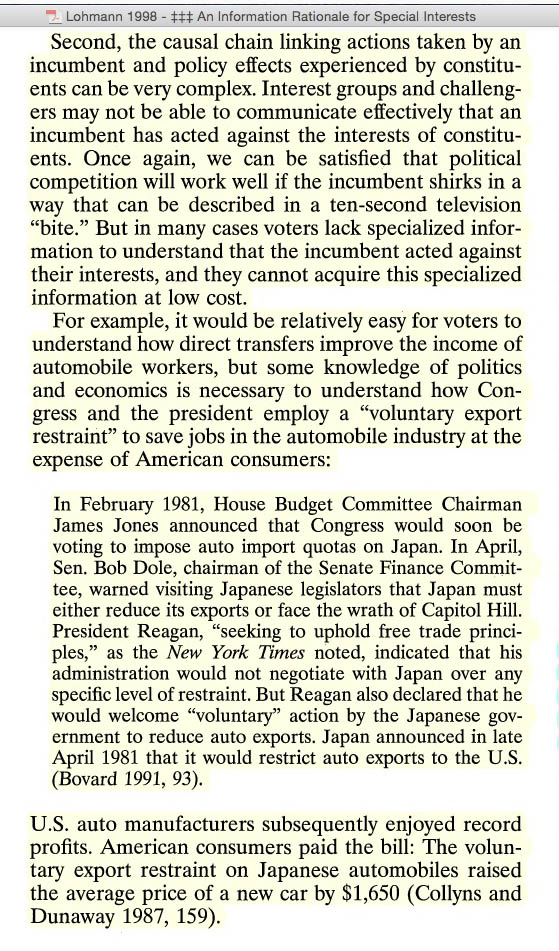
Susanne Lohmann 1988 - An Information Rational for Special Interests

Susanne Lohmann 1988 - An Information Rational for Special Interests
The genesis of it is that Congress is controlled by special interest groups with money. There is no public accountability anymore.Judge Charles R. Richey
Kessler 1997 (Inside Congress)
It strikes me as odd that legal scholars have not taken much of a critical look at the assumption that legislators are politically accountable in a strong enough sense to warrant the potent institutional consequences that are routinely attached to that accountability...legislative accountability is not inerely posited or argued to exist, but rather asserted as fact, as if irrefutable.Jane Schacter 2006
Political Accountability
The interpretation of members’ votes is not always easy and can be misleading, even for those more attentive to the process than the typical citizen is.David Vogler & Sidney Waldman 1985
Congress and Democracy
Accountability increases exploratory thought only when three conditions apply: (1) decision makers learn before forming any opinion that they will be accountable to an audience, (2) the audience’s views are unknown, and (3) they believe the audience is well informed and interested in accuracy. When all three conditions apply, people do their darnedest to figure out the truth, because that’s what the audience wants to hear. But the rest of the time – which is almost all of the time – accountability pressures simply increase confirmatory thought. People are trying harder to look right than to be right. Jonathan Haidt 2012
The Righteous Mind

Brent Ranalli 2018 - Weaponized Transparency (upcoming)

Brent Ranalli 2018 - Weaponized Transparency (upcoming)
Political accountability in modern, large-scale democracies rarely takes place through informed public monitoring of specific government programs and policies. A few discrete issues (abort ion, same-sex marriage) aside, and not counting political scandals, the public largely votes on the basis of its pocketbook and its feeling of security. The political consequences of war, terrorist attacks and economic distress - all of which are publicly observable - keep officeholders in line, but they retain vast discretion to choose among means.Eric Posner 2013
The Secrecy Paradox
Ballot initiatives, referenda, and other institutions of direct democracy aside, most political decisions are made not by the citizenry itself, but by the politicians elected to represent them in legislative assemblies. Because the constituencies of these representatives typically are geographically based, legislative officeholders have strong incentives to support programs and policies that provide benefits to the voters in their home districts or states, no matter how irresponsible those programs and policies may be from a national perspective. Such “pork barrel” projects are especially likely to gain a representative’s endorsement when they are financed by the taxpayers in general, most of whom reside, and vote, in other districts or states.
Legislative catering to the interests of the minority at the expense of the majority is reinforced by the logic of collective action. Small, homogeneous groups with strong communities of interest tend to be more effective suppliers of political pressure and political support (votes, campaign contributions, and the like) than larger groups whose interests are more diffuse. The members of smaller groups have greater individual stakes in favorable policy decisions, can organize at lower cost, and can more successfully control the free riding that otherwise would undermine the achievement of their collective goals. Because the vote motive provides reelection-seeking politicians with strong incentives to respond to the demands of small, well-organized groups, representative democracy frequently leads to a tyranny of the minority. George Stigler, Sam Peltzman, Gary Becker, and others used that same reasoning to model the decisions of regulatory agencies as being influenced by special-interest groups’ relative effectiveness in applying political pressure.
The logic of collective action explains why farmers have secured government subsidies at the expense of millions of unorganized consumers, who pay higher prices for food, and why textile manufacturers have benefited significantly from trade barriers at the expense of clothing buyers. Voted on separately, neither of those legislatively enacted special-interest measures would pass. But by means of logrolling bargains, in which the representatives of farm states agree to trade their votes on behalf of trade protectionism in exchange for pledges of support for agricultural subsidies from the representatives of textile-manufacturing states, both bills can secure a majority. Alternatively, numerous programs of this sort can be packaged in omnibus bills that most legislators will support in order to get their individual pet projects enacted. The legislative pork barrel is facilitated by rational-voter ignorance about the adverse effects of legislative decisions on their personal well-being. It also is facilitated by electoral advantages that make it difficult for challengers to unseat incumbents, who, accordingly, can take positions that work against their constituents’ interests with little fear of reprisal.William F. Shughart II 2017
Public Choice
Many of us have a reflexive belief that open political processes are more accountable, but we don’t often ask “accountable to who”? It’s easy to assume that the accountability is to a broader public interest. But in practice, transparency means that focused special interests can keep tabs on each proposal. If the special interests object, they can whip up a storm of protests. They also can threaten attempts at compromise, and push instead toward holding hard lines and party lines. Greater openness means a greater ability to monitor, to pressure, and to punish possible and perceived deviations.Timothy Taylor 2019
When Special Interests Play in the Sunlight
The results suggest that most voters do not know what they need to know in order to vote retrospectively...a substantial portion of voters do not possess the knowledge assumed by theories of economic voting. This is true even in the case of Finland, which has high civic literacy and a highly educated public. Only 38% could name all four parties in the government coalition, without also incorrectly naming any additional parties...The implications for government accountability are discussed.Lauri Rapeli 2016
Who to Punish? Retrospective Voting
The probability that your individual vote will change the outcome of a major election or referendum is roughly on the order of the probability you will win the Powerball.Jason Brennan 2016
Against Democracy
Translation of opinion into actions of electoral punishment or reward is a tortuous and uncertain procedure. The predictability of electoral response to a particular action remains so uncertain that the avoidance of a sensible decision because it will lose votes is usually the work of a man whose anxieties outweigh his capacities of prediction. V.O. Key 1964
Public Opinion and American Democracy

